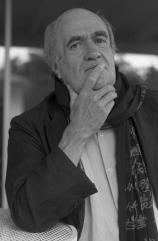The Master
Review
The Master
Henry James made his reputation as a sophisticated observer of 19th-century society. His books, such as PORTRAIT OF A LADY and THE TURN OF THE SCREW, provide detailed psychological studies of his characters and their motivations. In THE MASTER, the observer is himself observed. Colm Tóibín turns Henry James into a leading character in this spectacular achievement of literary fiction.
When writing about historical figures, the writer must choose which events will best illuminate his chosen subject. Colm Tóibín shows us Henry James at moments of intense emotional stress, experienced or remembered during the last years of the nineteenth century. One such incident is his wounded brother's return from the Civil War, a conflict Henry James passively allowed his parents to protect him from. He must ask himself why he declined to fight, while unable to help absorbing his family's distress. Henry James can't stop seeing, can't stop feeling and understanding, which makes intimacy with other people impossible for him.
When he draws near to a street in Venice where a close friend and fellow novelist committed suicide, he murmurs, "I have come as close as I could, as near as I dared." This is at once a refusal to visit the scene of her death and an admission of his acute awareness that his friend expected more of him and he disappointed her. These multiple layers of meaning are common throughout the book and add greatly to its sense of depth and complexity. Is Henry James the Master because he is able to channel the upsetting incidents of his life into his work, or because of his aloofness? Terrible things happen to other people; Henry James is rarely directly involved. He watches and remembers.
It's hard to escape a sense of competition between the writer and his subject. Colm Tóibín is also an accomplished novelist and his powers of psychological observation are no less highly refined. His portrayal of Henry James's acute discomfort during Oscar Wilde's trial is particularly well done, as is his description of Henry James's drunken butler as "a cross between a ghost and someone who has seen a ghost." The story develops internally for the most part; it takes a writer of extraordinary skill to infuse Henry James, a very private man, a thinker and a worrier, with the same narrative impetus found in more dynamic characters.
THE MASTER will never be mistaken for light reading; like Henry James's own novels, it is dense and complex and worth every word. Colm Tóibín has given us a great gift: he has empowered us to see, to feel and to understand, along with one of the world's best.
Reviewed by Colleen Quinn on January 6, 2011
The Master
- Publication Date: May 25, 2004
- Hardcover: 352 pages
- Publisher: Scribner
- ISBN-10: 0743250400
- ISBN-13: 9780743250405





